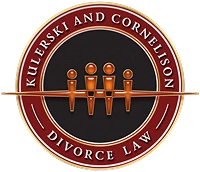
Cooperative Divorce Attorney in DuPage County, Illinois
Divorce does not have to be a battle. Many couples want to separate fairly, protect their families, and move forward without unnecessary conflict. A cooperative divorce can make that possible by focusing on communication, transparency, and problem-solving rather than confrontation.
At Kulerski & Cornelison, attorney Kari Cornelison helps clients throughout DuPage County approach divorce with honesty, respect, and efficiency. With more than 20 years of experience in Illinois family law, Kari guides clients through cooperative divorce in a way that saves time, reduces cost, and minimizes emotional strain.
Need Help Now?
What Is a Cooperative Divorce?
A cooperative divorce is a modern approach designed for spouses who are willing to work together toward a settlement. Rather than preparing for trial, both spouses and their attorneys agree to share information openly, negotiate in good faith, and prioritize resolution.
The goal is to reach a fair agreement without escalating conflict or relying on the court to make deeply personal decisions. This approach differs from traditional litigation, where communication often flows only through attorneys and preparation centers on courtroom confrontation.
A cooperative divorce emphasizes:
- Transparency and voluntary information-sharing
- Open discussion of concerns and priorities
- Practical compromise rather than positional bargaining
- Maintaining control over outcomes
This process allows spouses to remain active participants in shaping their future while reducing stress and uncertainty.
How the Cooperative Divorce Process Works in Illinois
A cooperative divorce follows the same legal framework as any Illinois divorce, but the tone and method are different.
The process typically includes:
- One spouse files a Petition for Dissolution of Marriage in DuPage County
- Both spouses agree to cooperate and act in good faith
- Financial documents are exchanged voluntarily rather than through formal discovery
- Attorneys guide discussions on property, parenting, and support
- Once agreements are reached, settlement documents are prepared and submitted to the court
By avoiding contested motions and unnecessary court appearances, many cooperative divorces move more efficiently than litigated cases. For families living and working in DuPage County, this approach often preserves civility and reduces the emotional toll of divorce.
Benefits of a Cooperative Divorce
A cooperative divorce offers several meaningful advantages for couples who want to resolve their divorce with dignity and control.
Lower Cost
With fewer court hearings, discovery disputes, and contested motions, cooperative divorce often costs significantly less than traditional litigation.
Less Emotional Stress
Working together encourages productive communication and keeps the focus on solutions rather than blame, which can be especially important for families with children.
Faster Resolution
When both parties commit to negotiation and transparency, cases can often be resolved in weeks or a few months rather than a year or longer.
Greater Control
Instead of leaving decisions to a judge, spouses design agreements that reflect their family’s unique needs, priorities, and long-term goals.
Healthier Co-Parenting
For parents, cooperative divorce can lay the groundwork for more effective long-term co-parenting by fostering respect and communication from the start.
Is a Cooperative Divorce Right for You?
A cooperative divorce works best when both spouses share certain goals. It is most effective when both parties:
- Are committed to acting respectfully and in good faith
- Are honest and transparent about finances and assets
- Want to avoid prolonged court battles
- Are willing to compromise for a fair outcome
Even when disagreements exist at the outset, an experienced attorney can help guide discussions in a productive direction. Kari Cornelison has helped many clients who began with uncertainty and concern but ultimately reached agreements that worked for both sides.
If one spouse refuses to cooperate, hides assets, or will not negotiate honestly, a cooperative divorce may not be appropriate. In those cases, traditional negotiation or litigation may be necessary. Kari provides candid guidance about which approach best protects your interests.
Cooperative Divorce vs. Collaborative Divorce
Although cooperative and collaborative divorce share similar goals, they are not the same.
In a collaborative divorce:
- Attorneys must withdraw if negotiations fail
- New counsel must be hired for litigation
In a cooperative divorce:
- Attorneys are not required to withdraw
- Negotiation can continue, or the case can shift if needed
This flexibility makes cooperative divorce a practical choice for couples who want to work together but prefer to keep all legal options available.
Issues Addressed in a Cooperative Divorce
Even when spouses cooperate, all legal issues required under Illinois law must still be resolved before a divorce can be finalized.
These include:
- Division of marital property and debts
- Allocation of parental responsibilities
- Parenting time schedules
- Child support and spousal maintenance
- The marital home or other real estate
- Education-related expenses
- Health and life insurance obligations
Kari Cornelison ensures each agreement complies with Illinois law and reflects a fair, balanced resolution that protects clients long after the divorce is complete.
The Importance of Legal Guidance
While cooperative divorce is designed to reduce conflict, it still involves complex legal and financial decisions. Having experienced legal guidance helps ensure agreements are complete, enforceable, and structured to avoid future disputes.
Kari combines a practical understanding of Illinois divorce law with a calm, solution-oriented approach to negotiation. She takes the time to explain each term of an agreement so clients understand how it affects their rights, finances, and future.
Serving Clients Throughout DuPage County
From her Oak Brook office, Kari Cornelison serves clients throughout DuPage County, including communities such as Naperville, Wheaton, Downers Grove, Hinsdale, Clarendon Hills, Lombard, and surrounding areas. Her practice focuses exclusively on family law, giving clients the benefit of deep local knowledge and consistent experience.
Contact Kulerski & Cornelison
If you are considering a cooperative divorce in DuPage County, you deserve clear guidance from an attorney who understands both the legal process and the human side of divorce.
Attorney Kari Cornelison has more than two decades of experience helping Illinois couples resolve their divorces without unnecessary conflict. She is ready to discuss your goals, explain your options, and help you take the next step toward a respectful resolution.
Contact Kulerski & Cornelison today to schedule a confidential consultation and learn more about how cooperative divorce can help you move forward with confidence.



